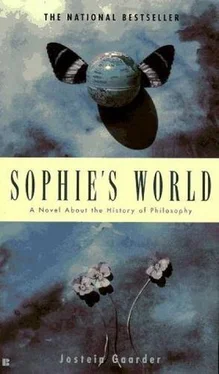Jostein Gaarder - Sophie's World - A Novel About the History of Philosophy
Здесь есть возможность читать онлайн «Jostein Gaarder - Sophie's World - A Novel About the History of Philosophy» весь текст электронной книги совершенно бесплатно (целиком полную версию без сокращений). В некоторых случаях можно слушать аудио, скачать через торрент в формате fb2 и присутствует краткое содержание. ISBN: , Издательство: BERKLEY BOOKS, NEW YORK, Жанр: Философия, на английском языке. Описание произведения, (предисловие) а так же отзывы посетителей доступны на портале библиотеки ЛибКат.
- Название:Sophie's World: A Novel About the History of Philosophy
- Автор:
- Издательство:BERKLEY BOOKS, NEW YORK
- Жанр:
- Год:неизвестен
- ISBN:0-425-15225-1
- Рейтинг книги:4 / 5. Голосов: 1
-
Избранное:Добавить в избранное
- Отзывы:
-
Ваша оценка:
- 80
- 1
- 2
- 3
- 4
- 5
Sophie's World: A Novel About the History of Philosophy: краткое содержание, описание и аннотация
Предлагаем к чтению аннотацию, описание, краткое содержание или предисловие (зависит от того, что написал сам автор книги «Sophie's World: A Novel About the History of Philosophy»). Если вы не нашли необходимую информацию о книге — напишите в комментариях, мы постараемся отыскать её.
Sophie's World: A Novel About the History of Philosophy — читать онлайн бесплатно полную книгу (весь текст) целиком
Ниже представлен текст книги, разбитый по страницам. Система сохранения места последней прочитанной страницы, позволяет с удобством читать онлайн бесплатно книгу «Sophie's World: A Novel About the History of Philosophy», без необходимости каждый раз заново искать на чём Вы остановились. Поставьте закладку, и сможете в любой момент перейти на страницу, на которой закончили чтение.
Интервал:
Закладка:
The next moment he appeared among the ancient ruins. High up beneath the sky—at the top of Sophie’s screen—towered the monumental Athene temple on the Acropolis. Her philosophy teacher had seated himself on one of the blocks of marble. He looked into the camera and said: “We are sitting in the old agora in Athens. A sorry sight, don’t you think? Today, I mean. But once it was surrounded by splendid temples, courts of justice and other public offices, shops, a concert hall, and even a large gymnastics building. All situated around the square, which was a large open space ... The whole of European civilization was founded in this modest area.
“Words such as politics and democracy, economy and history, biology and physics, mathematics and logic, theology and philosophy, ethics and psychology, theory and method, idea and system date back to the tiny populace whose everyday life centered around this square. This is where Socrates spent so much of his time talking to the people he met. He might have buttonholed a slave bearing a jar of olive oil, and asked the unfortunate man a question on philosophy, for Socrates held that a slave had the same common sense as a man of rank. Perhaps he stood in an animated wrangle with one of the citizens—or held a subdued conversation with his young pupil Plato. It is extraordinary to think about. We still speak of Socratic or Platonic philosophy, but actually being Plato or Socrates is quite another matter.”
Sophie certainly did think it was extraordinary to think about. But she thought it was just as extraordinary the way her philosopher was suddenly talking to her on a video that had been brought to her own secret hideout in the garden by a mysterious dog.
The philosopher rose from the block of marble he was sitting on and said quietly: “It was actually my intention to leave it at that, Sophie. I wanted you to see the Acropolis and the remains of the old agora in Athens. But I am not yet sure that you have grasped just how splendid these surroundings once were ... so I am very tempted to go a bit further. It is quite irregular of course ... but I am sure I can count on it remaining just between the two of us. Oh well, a tiny glimpse will suffice anyway ...”
He said no more, but remained standing there for a long time, staring into the camera. While he stood there, several tall buildings had risen from the ruins. As if by magic, all the old buildings were once again standing.
Above the skyline Sophie could still see the Acropolis, but now both that and all the buildings down on the square were brand-new. They were covered with gold and painted in garish colors. Gaily dressed people were strolling about the square. Some wore swords, others carried jars on their heads, and one of them had a roll of papyrus under his arm.
Then Sophie recognized her philosophy teacher. He was still wearing the blue beret, but now he was dressed in a yellow tunic in the same style as everyone else. He came toward Sophie, looked into the camera, and said:
“That’s better! Now we are in the Athens of antiquity, Sophie. I wanted you to come here in person, you see. We are in the year 402 B.C., only three years before Socrates dies. I hope you appreciate this exclusive visit because it was very difficult to hire a video camera ...”
Sophie felt dizzy. How could this weird man suddenly be in Athens 2,400 years ago? How could she be seeing a video film of a totally different age? There were no videos in antiquity ... so could this be a movie?
But all the marble buildings looked real. If they had recreated all of the old square in Athens as well as the Acropolis just for the sake of a film—the sets would have cost a fortune. At any rate it would be a colossal price to pay just to teach Sophie about Athens.
The man in the beret looked up at her again.
“Do you see those two men over there under the colonnade?”
Sophie noticed an elderly man in a crumpled tunic. He had a long unkempt beard, a snub nose, eyes like gimlets, and chubby cheeks. Beside him stood a handsome young man.
“That is Socrates and his young pupil, Plato. You are going to meet them personally.”
The philosopher went over to the two men, took off his beret, and said something which Sophie did not understand. It must have been in Greek. Then he looked into the camera and said, “I told them you were a Norwegian girl who would very much like to meet them. So now Plato will give you some questions to think about. But we must do it quickly before the guards discover us.”
Sophie felt the blood pounding in her temples as the young man stepped forward and looked into the camera.
“Welcome to Athens, Sophie,” he said in a gentle voice. He spoke with an accent. “My name is Plato and I am going to give you four tasks. First you must think over how a baker can bake fifty absolutely identical cookies. Then you can ask yourself why all horses are the same. Next you must decide whether you think that man has an immortal soul. And finally you must say whether men and women are equally sensible. Good luck!”
Then the picture on the TV screen disappeared. Sophie wound and rewound the tape but she had seen all there was.
Sophie tried to think things through clearly. But as soon as she thought one thought, another one crowded in before she had thought the first one to its end.
She had known from the start that her philosophy teacher was eccentric. But when he started to use teaching methods that defied all the laws of nature, Sophie thought he was going too far.
Had she really seen Socrates and Plato on TV? Of course not, that was impossible. But it definitely wasn’t a cartoon.
Sophie took the cassette out of the video recorder and ran up to her room with it. She put it on the top shelf with all the Lego blocks. Then she sank onto the bed, exhausted, and fell asleep.
Some hours later her mother came into the room. She shook Sophie gently and said:
“What’s the matter, Sophie?”
“Mmmm?”
“You’ve gone to sleep with all your clothes on!”
Sophie blinked her eyes sleepily.
“I’ve been to Athens,” she mumbled. That was all she could manage to say as she turned over and went back to sleep.
Plato
… a longing to return to the realm of the soul…
Sophie woke with a start early the next morning. She glanced at the clock. It was only a little after five but she was so wide awake that she sat up in bed. Why was she wearing a dress? Then she remembered everything.
She climbed onto a stool and looked on the top shelf of the closet. Yes—there, at the back, was the video cassette. It hadn’t been a dream after all; at least, not all of it.
But she couldn’t really have seen Plato and Socrates ... oh, never mind! She didn’t have the energy to think about it any more. Perhaps her mother was right, perhaps she was acting a bit nuts these days.
Anyway, she couldn’t go back to sleep. Perhaps she ought to go down to the den and see if the dog had left another letter. Sophie crept downstairs, put on a pair of jogging shoes, and went out.
In the garden everything was wonderfully clear and still. The birds were chirping so energetically that Sophie could hardly keep from laughing. The morning dew twinkled in the grass like drops of crystal. Once again she was struck by the incredible wonder of the world.
Inside the old hedge it was also very damp. Sophie saw no new letter from the philosopher, but nevertheless she wiped off one of the thick roots and sat down.
She recalled that the video-Plato had given her some questions to answer. The first was something about how a baker could bake fifty identical cookies.
Sophie had to think very carefully about that, because it definitely wouldn’t be easy. When her mother occasionally baked a batch of cookies, they were never all exactly the same. But then she was not an expert pastry cook; sometimes the kitchen looked as if a bomb had hit it. Even the cookies they bought at the baker’s were never exactly the same. Every single cookie was shaped separately in the baker’s hands.
Читать дальшеИнтервал:
Закладка:
Похожие книги на «Sophie's World: A Novel About the History of Philosophy»
Представляем Вашему вниманию похожие книги на «Sophie's World: A Novel About the History of Philosophy» списком для выбора. Мы отобрали схожую по названию и смыслу литературу в надежде предоставить читателям больше вариантов отыскать новые, интересные, ещё непрочитанные произведения.
Обсуждение, отзывы о книге «Sophie's World: A Novel About the History of Philosophy» и просто собственные мнения читателей. Оставьте ваши комментарии, напишите, что Вы думаете о произведении, его смысле или главных героях. Укажите что конкретно понравилось, а что нет, и почему Вы так считаете.












